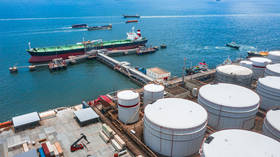EU officially adopts price cap on Russian oil

The EU has decided to cap the price of Russian seaborne oil exports at $60 per barrel, according to the latest edition of the Official Journal of the EU, published on Saturday. Russia has repeatedly stated it will not trade with companies adopting the price cap.
“The Council decided today to set an oil price cap for crude oil and petroleum oils and oils obtained from bituminous minerals which originate in or are exported from Russia, at USD 60 per barrel,” the EU Council said in a statement following the publication.
The measure is to come into effect on December 5, with a transition period of 45 days for vessels carrying Russian oil purchased and loaded prior to that date, and unloaded at the port of destination prior to January 19, 2023.
The cap will be reviewed every two months “to adapt to the market situation,” with a transition period of 90 days after every change. Further price caps are to be set at least 5% below the average market price for Russian oil, based on data from the International Energy Agency.
“It shall be prohibited to provide, directly or indirectly, technical assistance, brokering services or financing or financial assistance, related to the trading, brokering or transport, including through ship-to-ship transfers, to third countries of crude oil or petroleum products…which originate in Russia or which have been exported from Russia,” the EU clarified in the Journal.
Russian oil and oil products which are sold at or below the $60 threshold will be exempt from these restrictions. Additionally, a cap on Russia’s other petroleum products will come into force on February 5.
The council said vessels intentionally carrying Russian oil sold above the price cap will face consequences, such as a ban on EU insurance, and financing and servicing connected to third country flagged ships. If an EU vessel violates the cap, it may be punished in accordance with each member state's national legislation.
Russia has repeatedly warned it will not supply its energy to countries that support the price cap.
For more stories on economy & finance visit RT's business section













